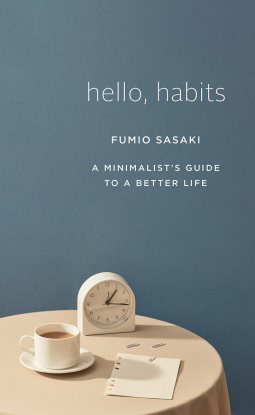Efficiency. [Hello, Habits by Fumio Sasaki]
The internationally best-selling author of Goodbye, Things shares insights and practices to help you become the best version of yourself.
Fumio Sasaki changed his life when he became a minimalist. But before minimalism could really stick, he had to make it a habit. All of us live our lives based on the habits we’ve formed, from when we get up in the morning, to what we eat and drink, to how likely we are to actually make it to the gym. In Hello, Habits, Sasaki explains how we can acquire the new habits that we want—and get rid of the ones that don’t do us any good.
Bringing together leading theories and tips from cognitive psychology, along with examples from his own life, he unravels common misperceptions about “willpower” and “talent,” and offers a step-by-step guide to success. Ultimately, Sasaki shows how ordinary people like himself can use his principles of good habit-making to improve themselves and change their lives.
I think when you pick up a book with the idea that you're going to learn or read tips on how to successfully develop habits, you expect a simple, straightforward step-by-step manual. Maybe the author contextualizes the steps in a personal context. Fine, that's also expected from self-help books. But with habits specifically, I wanted the focus on habits. Unfortunately, during my read of Fumio Sasaki's Hello, Habits, I found the focus to be a lot more spread out.
The author contextualizes habit forming with a detailing of his history of developing habits and self-improvement as a single, formerly alcoholic, formerly overweight man. What bothered me was the tone of this contextualization. It was very much a "this is the way I'm living and this is also the way to be, the standard to aim to." Maybe a subtle tinge of fatphobia was sensed throughout. For instance, the random instance where the author portrays his presumably formerly skinny friend who in his adulthood had gained weight as having given up.
I very much enjoyed the psychology and science rationales given behind the outlined methodology, but, at least in the copy I was able to read, citations were non-existent, which some times just added to a sense of rambling. Overall, the book made me think about my habits and impediments to keeping them. And I thought it was a good primer to habits. Still, the optimal approach to habits also read like how to itemize your time and life. As if you couldn't develop a habit without trying for maximal life efficiency. I think one read was enough for me and can't think of a good number of people I'd recommend this to, so 3 stars from me.
Hello, Habits (ISBN:9781324005582) was published January 2021.

Comments
Post a Comment